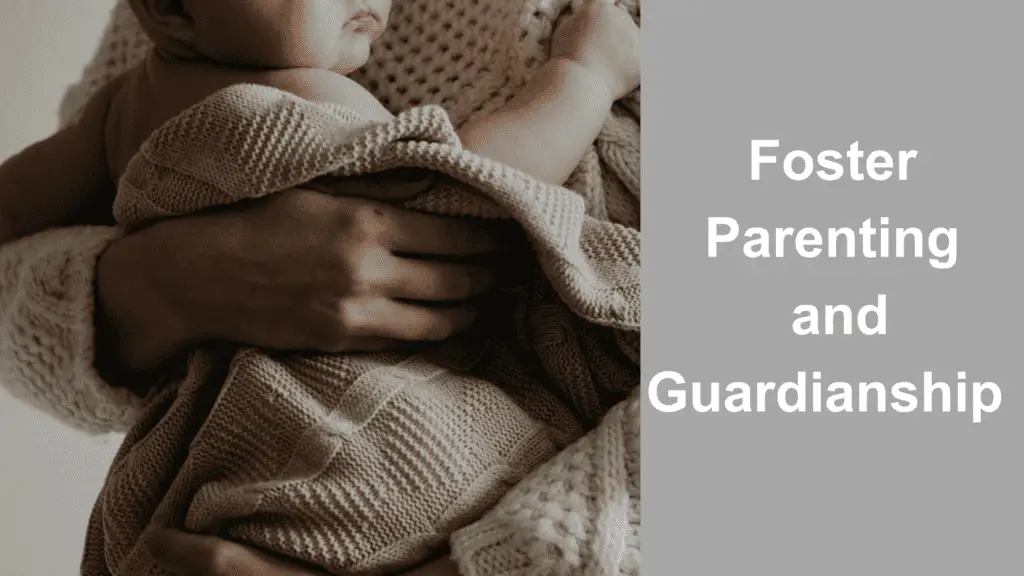Foster care and legal guardianship are two terms that are often used interchangeably, but they have distinct meanings and implications. It is because of this the question “Are foster parents legal guardians?” pop up among many people. Foster care refers to the temporary placement of children in the care of a family or individual who is not their biological parent, due to various reasons such as abuse. Legal guardianship, on the other hand, is a legal relationship between a child and a responsible adult who is not the child’s parent, but who has been granted the legal authority to care for the child.
The answer to the question “Are foster parents legal guardians?” is not straightforward. This is because the relationship between foster parents and the children in their care is different from that of legal guardians.
The Role of Foster Parents
Foster parents play a crucial role in the child welfare system. They provide temporary care and support to children who are unable to live with their biological parents due to abuse, neglect, or other reasons. These caregivers are typically screened, trained, and licensed by the state or local government, and are held to high standards of care and conduct.
There are different types of foster care arrangements, each with its own specific requirements and objectives. Kinship care refers to the placement of children with relatives or close family friends who are willing and able to care for them. Non-relative foster care involves the placement of children with licensed foster parents who are not related to them.
Emergency foster care is a short-term placement of children who are removed from their homes due to an urgent situation, such as a domestic violence incident. Respite care is a temporary placement of children to give their regular foster parents a break or to provide relief during a crisis.
Regardless of the type of placement, foster parents have several key responsibilities in caring for the children placed in their homes. They must provide a safe and stable environment that meets the physical, emotional, and social needs of the child. This includes providing food, shelter, clothing, and medical care, as well as nurturing and supportive interactions.
Read About Different Types of Foster Care Placement
Foster parents are also expected to support the child’s education, cultural and religious identity, and connections with family and community. Additionally, they are required to work collaboratively with social workers, therapists, and other professionals involved in the child’s case, and to maintain accurate records and reports of the child’s progress and well-being.
Legal Guardianship
Legal guardianship is a legal relationship between a child and a responsible adult who is not the child’s parent, but who has been granted the legal authority to care for the child. The purpose of legal guardianship is to provide a stable and permanent home for a child who cannot live with their biological parents and to ensure that the child’s needs are met and their best interests are protected.

Process of Becoming a Legal Guardian
The legal process of becoming a legal guardian varies by state and jurisdiction. Generally, it involves filing a petition with a court and attending a hearing to demonstrate that the proposed guardian is capable and suitable to care for the child. The court then considers factors such as the guardian’s relationship with the child, their financial stability, their criminal history, and their ability to provide a safe and nurturing environment for the child.
If it approves the guardianship, the guardian will be given legal custody of the child and will assume responsibility for making decisions about the child’s education, medical care, and other important aspects of their life.
Rights and Responsibilities of Legal Guardians
Legal guardians have both rights and responsibilities in caring for the child placed in their care. They are also held to high standards of care and conduct.
They have the right to make decisions about the child’s education, healthcare, and general welfare, as well as the right to receive public assistance and benefits on behalf of the child.
However, they also have the responsibility to provide for the child’s basic needs, such as food, clothing, and shelter, as well as to ensure the child’s safety and well-being.
Legal guardians are also required to comply with any court orders or mandates related to the child’s care, such as visitation arrangements or therapy sessions.
Foster Parents as Legal Guardians
One question that often arises in discussions about foster care and legal guardianship is whether foster parents are also legal guardians. The answer to this question is not straightforward, as the relationship between foster parents and children in their care is different from that of legal guardians.
Differences between Foster Care and Legal Guardianship
Foster care is a temporary placement for children who are unable to live with their biological parents, while legal guardianship is a permanent legal relationship between a child and an adult who assumes responsibility for their care.
In foster care, the state or local government retains legal custody of the child, and the foster parent acts as a caregiver under the supervision of the child welfare agency.
Foster parents do not have the legal authority to make major decisions about the child’s life, such as medical treatment or education.
Access Free Online Foster Parenting Training Resources
Circumstances in Which Foster Parents May Become Legal Guardians
There are circumstances in which foster parents may become legal guardians of the children in their care.
For example, if a child is placed in kinship care with a relative or close family friend, the court may grant legal guardianship to the relative or friend. In this case, the guardian would have legal custody of the child and would assume responsibility for making decisions about the child’s life.
Similarly, if a child is eligible for adoption and the foster parents wish to adopt, they may become legal guardians through the adoption process.
Another option is for foster parents to pursue permanent guardianship of the child, which is a legal relationship that gives them the same legal rights and responsibilities as legal guardians. Permanent guardianship is a less restrictive option than adoption and may be appropriate in cases where the child cannot return to their biological family but is not eligible for adoption.
Benefits of Legal Guardianship for Foster Parents
Legal guardianship offers several benefits for both foster parents and the children in their care. For foster parents, legal guardianship provides a sense of permanency and stability for the child and the family unit.
It also gives them the legal authority to make important decisions about the child’s life, such as medical treatment, education, and extracurricular activities. Additionally, legal guardianship allows the family to receive public assistance and benefits, which may not be available in the foster care system.
For children, legal guardianship can provide a sense of security and permanency, as they have a stable and loving family to call their own. It also provides a sense of continuity in their lives, as they do not have to worry about being moved from home to home.

Legal guardianship also offers a stronger emotional connection between the child and their caregiver, which can be important for their emotional and mental well-being.
Challenges That Foster Parents May Face When Seeking Legal Guardianship
Despite the benefits of legal guardianship, foster parents also face challenges when seeking legal guardianship of the children in their care.
For example, the legal process can be time-consuming, complex, and expensive. There may also be legal requirements that must be met before guardianship can be granted, such as a background check, a home study, and a demonstration of financial stability. In addition, the biological parents may object to the guardianship, which can lead to a legal battle.
How Foster Parents Can Navigate the Legal Process of Becoming Legal Guardians
To navigate the legal process of becoming legal guardians, foster parents need to seek the guidance of an attorney or a legal aid organization. They also work closely with the child welfare agency and the court system to ensure that they are meeting all legal requirements and demonstrating their ability to provide a stable and loving home for the child. It is important for foster parents to remain patient, persistent, and committed to the child’s well-being throughout the process.
Conclusion
In summary, foster parents play an essential role in providing safe and stable homes for children in need. Legal guardianship, while different from foster care, can offer a sense of permanency, stability, and continuity for both foster parents and the children in their care.
Becoming a legal guardian can present benefits for the child, including emotional and mental stability, and for the foster parents, it can offer a sense of permanency and legal authority over important decisions in the child’s life.
One should understand the differences between foster care and legal guardianship and the circumstances in which foster parents may seek legal guardianship. Foster parents may encounter challenges when seeking legal guardianship, but it is essential for them to remain committed to the child’s well-being throughout the process.
It is vital to seek out more information about foster care and legal guardianship. There are resources available, including child welfare agencies, legal aid organizations, and support groups for foster parents. With more knowledge about these systems, we can work together to provide safe, stable, and permanent homes for children in need.







